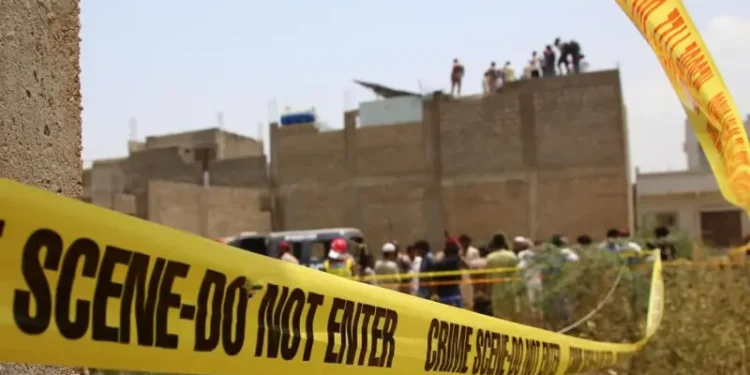India has accused Pakistan of launching drone and missile attacks on three of its military bases—a claim Pakistan firmly denies.
According to the Indian Army, they thwarted Pakistan’s attempts to strike military bases in Jammu and Udhampur, located in Indian-administered Kashmir, as well as Pathankot in Punjab.
On Thursday evening, multiple blasts rocked Jammu city, triggering a region-wide blackout.
Pakistan’s Defence Minister Khawaja Asif denied any involvement in an interview with the BBC.
“We deny it, we have not mounted anything so far,” he said. “We will not strike and then deny.”
Image source: EPA
Image caption: A police truck patrols a blackout-hit area in Srinagar, amid reports of explosions in Jammu.
Earlier the same day, India claimed it had targeted Pakistan’s air defences, effectively neutralizing Islamabad’s alleged efforts to strike Indian military targets on Wednesday night.
Pakistan responded by condemning India’s action as another “act of aggression,” citing Indian missile strikes on locations within Pakistan and Pakistan-administered Kashmir.
India’s strikes prompted urgent calls for restraint from global leaders and the United Nations, urging both nations to de-escalate. The attacks, coupled with ongoing shelling along the border, have intensified fears of a broader conflict between the two nuclear-armed neighbors.
This marks the most serious confrontation between India and Pakistan in over 20 years.
India stated it targeted nine “terrorist infrastructure” sites on Wednesday in retaliation for a deadly attack on tourists in Indian-administered Kashmir last month.
Pakistan has denied backing the militants responsible for killing 26 civilians in the mountainous town of Pahalgam, calling India’s claims unfounded.
The Pahalgam incident was the deadliest civilian attack in the region in years, heightening tensions dramatically. Most of the victims were Indian tourists.
The region of Indian-administered Kashmir has endured a long-standing insurgency against Indian governance, resulting in thousands of deaths.
Kashmir remains a flashpoint since India and Pakistan’s independence from British rule in 1947. Both countries claim the region and have fought two wars over it.
Image source: Reuters
Image caption: Families evacuated from border areas arrive at a shelter in Jammu on 8 May 2025, following intense shelling.
Despite international appeals for calm, both sides continued to trade accusations of military aggression on Thursday.
Pakistan’s military spokesman, Lt Gen Ahmed Sharif Chaudhry, accused India of launching drone strikes on multiple sites.
“Last night, India showed another act of aggression by sending drones to multiple locations,” he said, listing Lahore, Gujranwala, Chakwal, Rawalpindi, Attock, Bahawalpur, Miano, Chor, and areas near Karachi.
He reported one civilian killed in Sindh and four soldiers injured in Lahore. The U.S. consulate in Lahore instructed staff to shelter in place.
India defended its actions, stating it responded to Pakistan’s attempts to engage military targets across northern and western India.
A Defence Ministry statement claimed, “It has been reliably learnt that an Air Defence system at Lahore has been neutralised.” Pakistan denied the assertion.
No independent sources have confirmed either side’s claims.
India’s Foreign Secretary Vikram Misri addressed reporters in Delhi later that day, saying,
“Our intention has not been to escalate matters, we are only responding to the original escalation.”
Casualty figures continue to climb. Pakistan reports 31 deaths and 57 injuries from Indian airstrikes in Pakistan and Pakistan-administered Kashmir, including border clashes since Wednesday morning.
India’s military said 16 people had died due to Pakistani firing in Kashmir, including three women and five children.
Initially, India did not identify the group responsible for the Pahalgam attack. However, on 7 May, it blamed the Pakistan-based Lashkar-e-Taiba group.
Indian police claimed two attackers were Pakistani nationals, a charge Islamabad rejected, maintaining it had no connection to the 22 April attacks.
In a late-night address on Wednesday, Pakistan’s Prime Minister Shehbaz Sharif vowed retaliation for the casualties caused by Indian strikes. He also repeated the military’s claim of shooting down five Indian fighter jets—an assertion India has yet to address.
Following Thursday’s explosions in Jammu, Indian military sources reported further blasts in the towns of Akhnoor, Samba, and Kathua across the region.









